| | | OFFLINE | | Post: 26.577
Post: 9.064 | Registrato il: 28/08/2005
Registrato il: 20/01/2009 | Administratore | Utente Master | |
|

 Thursday, April 18, Third Week of Easter
Thursday, April 18, Third Week of Easter
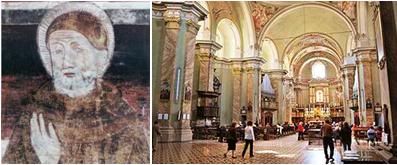 BLESSED JACOPO DA LODI [James of Oldo] (Italy, 1364-1404)
BLESSED JACOPO DA LODI [James of Oldo] (Italy, 1364-1404)
Widower, Franciscan priest
He was a well-to-do citizen of Lodi near Milan who married well and had two daughterS.
He lost both children during a plague, and after that, he and his wife became lay
Franciscans dedicated to helping the poor and the sick. When his wife died, he became
a priest and continued his apostolate with the poor and the sick. Soon after he died,
at least 12 miracles were officially attributed to him, and his body was found incorrupt
when exhumed decades later. He is buried in the Church of Santa Maria Maddalena in Lodi,
his hometown. He was beatified in 1933.
Readings for today's Mass:
www.usccb.org/bible/readings/041813.cfm
AT THE VATICAN TODAY
Pope Francis met today with
- H.E. António Carlos Carvalho de Almeida Ribeiro, Ambassador of Portugal to the Holy See,
who presented his credentials.
- His Beatitude Gregorios III Laham, Patriarch of Antioch of the Greek Melkites (Syria)
- Eight bishops from the northeast Italian regions on ad-limina visit
One year ago today...
After a flurry of articles in past days by leading Vaticanistas in Italy and France anticipating a final positive resolution of the FSSPX issue, the FSSPX itself issued a statement saying flatly that 'the reality is different'. It said FSSPX Superior-General Mons. Bernard Fellay submitted a response on April 17, 2012, to the CDF which on March 16, 2012, had requested a clarification on the FSSPX position regarding the proposed Doctrinal Preamble to any reconciliation, and that this response was but a stage in the process. (As we all know, Fellay's response was reviewed by the CDF and Benedict XVI himself, and subsequently rejected as inadequate because the FSSPX is adamant about its opposition to Vatican II as Church Magisterium.)
And in the annals of Benedict XVI's Pontificate -



On this day last year, the Holy Father resumed his catechetical cycle on Christian prayer, in which earlier, he had begun to reflect on the prayers recounted in the Acts of Apostles. At the end of his plurilingual greetings, he expressed sincere thanks for all the wishes sent to him for the seventh anniversary of his
election as Pope and for his 85th birthday last Monday. He added:
 Here is the entire post on that GA - and I am indulging in a full re-post not just because of the catechesis but also because of the photos that looked particularly impressive for an 85-year-old man...
Here is the entire post on that GA - and I am indulging in a full re-post not just because of the catechesis but also because of the photos that looked particularly impressive for an 85-year-old man...
Full in the panting heart of Rome,
beneath the apostle’s crowning dome,
from pilgrims’ lips that kiss the ground
breathes in all tongues one only sound:
“God bless our Pope, the great, the good!”
- Nicholas Cardinal Wiseman (England, 1802-1865)
Cardinal Wiseman was the first Archbishop of Westminster after re-establishment of the Catholic hierarchy in England and Wales, 1950. He had a remarkable career and was a great speaker and writer but he has tended to be overshadowed by the other 8reat English cardinal of the 19th century, Blessed John Henry Newman.
GENERAL AUDIENCE TODAY
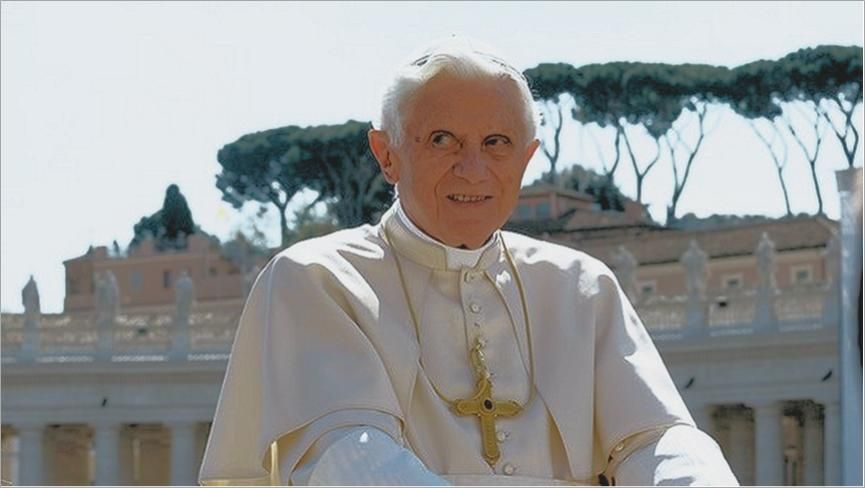 Remarkable insta-portraits of our beloved Benedict at 85 years and 2 days, in most of the news snapshots today. In the photo above, the Roman pines on the top of the nearby Janiculum hill provide a great background.
Remarkable insta-portraits of our beloved Benedict at 85 years and 2 days, in most of the news snapshots today. In the photo above, the Roman pines on the top of the nearby Janiculum hill provide a great background.
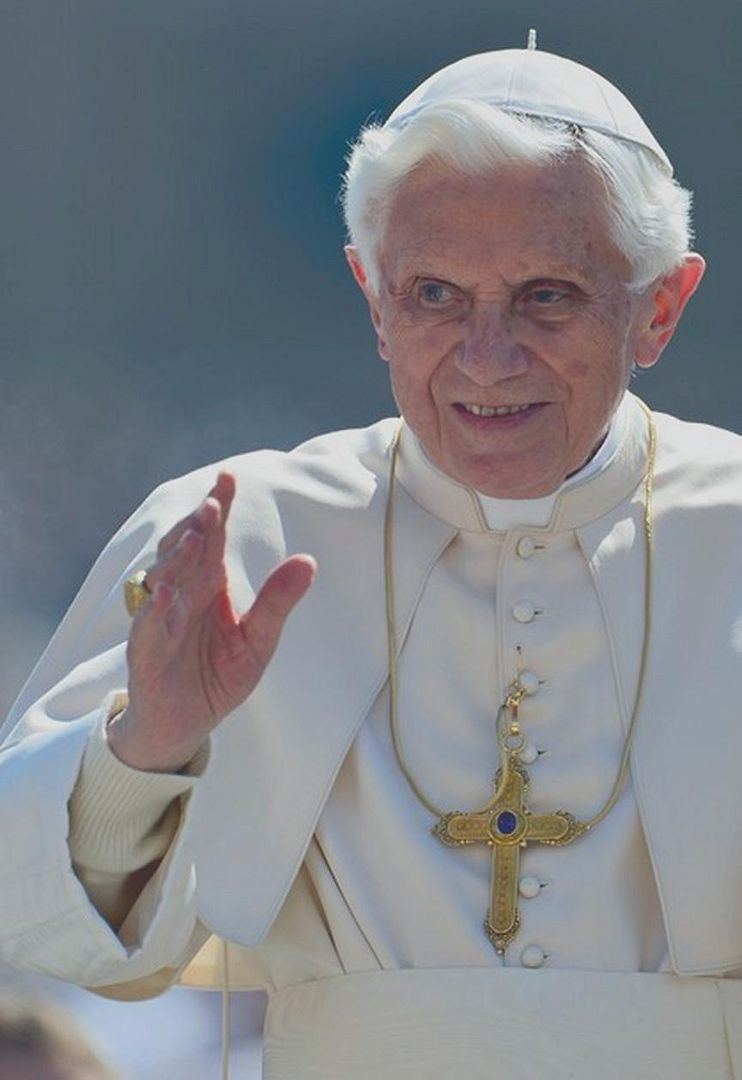
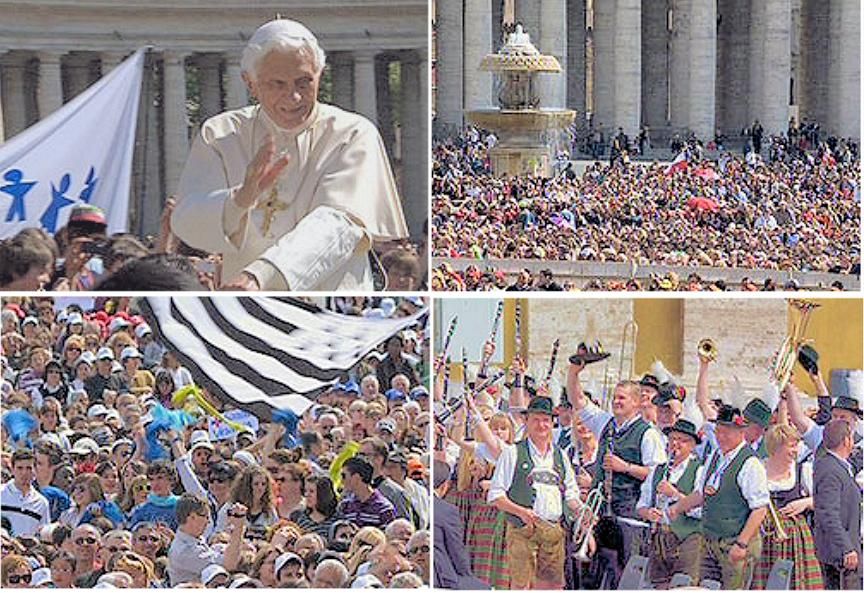
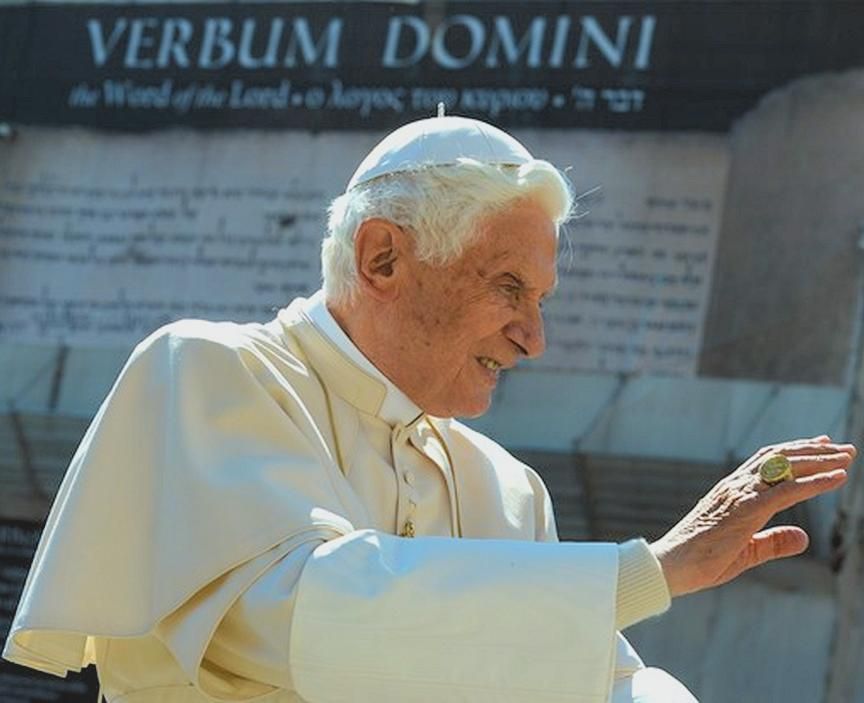
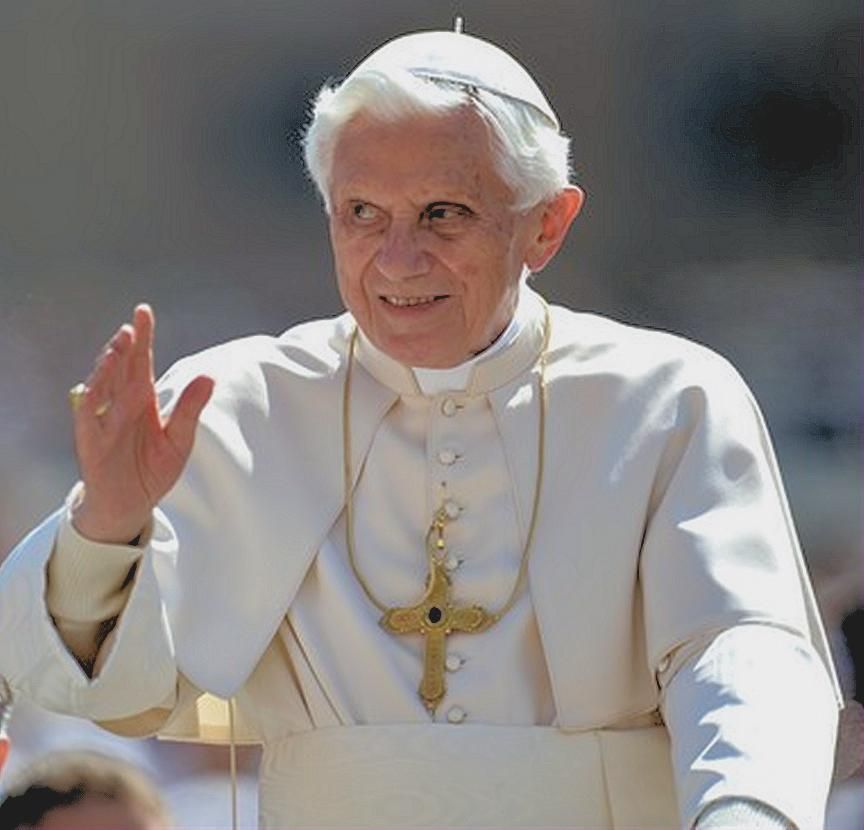 Even in persecution, the Church prays
Even in persecution, the Church prays
to be able to proclaim the faith

April 18, 2012
The Easter holidays may be over but there was an atmosphere of celebration in St Peter’s Square today as an estimated 40,000 pilgrims cheered Pope Benedict XVI and, in diverse languages, wished him a happy 85th birthday and “many more years” as Pastor of the Universal Church on the eve of the 7th anniversary of his election as Pope.
The Holy Father toured the piazza in an open-topped Popemobile, before and after the catechesis, and appeared well-rested after his six-day rest last week at the summer residence in Castel Gandolfo.
Some of the pilgrims held up giant banners expressing their best wishes for him. Later, he asked them to pray for him so that he may “persevere in his service to Christ and His Church”.
After a break of a few weeks in his catechetical cycle on Christian prayer - on account of his trip to Mexico and Cuba, his report on the trip, the Paschal Triduum, and a post-Easter catechesis - the Holy Father resumed the cycle by reflecting on the 4th chapter of the Acts of the Apostles, inspired by the story of Peter and John who were imprisoned - after healing a paralytic - because they had announced the resurrection of Jesus.
Here is a translation of the full catechesis:
Dear brothers and sisters,
After the great feast days, let us now return to the catecheses on prayer. In the audience before Holy Week, we dwelt on the figure of the Blessed Virgin Mary, present among the Apostles in prayer at the moment they were waiting for the descent of the Holy Spirit.
A praying atmosphere accompanied the first steps of the Church. Pentecost is not an isolated spirit, since the presence and the action of the Holy Spirit constantly guides and animates the journey of the Christian community.
In the Acts of the Apostles, in fact, St. Luke - beyond recounting the great effusion that descended over the Cenacle 50 days after Easter (cfr Acts 2,1-13),, refers to other extraordinary irruptions of the Holy Spirit, which return in the history of the Church.
Today, I wish to dwell on that which has been called the 'little Pentecost' which took place at the climax of a difficult phase in the life of the nascent Church.
The Acts of the Apostles narrate that, following the healing of a paralytic near the Temple of Jerusalem (cfr Acts,3-10),. Peter and John were arrested (cfr Acts 4,1), because they had been announcing the Resurrection of Christ to all the people (cfr Acts 3,11-26).
After a summary trial, they were set free, they went back to their brothers and told them what they had to suffer because of the witness that they been bearing about Jesus the Risen One. At that time, St. Luke says, "they raised their voices to God with one accord" (Acts 4,24).
Here, St. Luke reports the most ample prayer of the Church that we can find in the New Testament, at the end of which, as we heard, "the place where they were gathered shook, and they were all filled with the holy Spirit and continued to speak the word of God with boldness. (Acts 4,31).
Before considering this beautiful prayer, let us note an important basic attitude: In the face of danger, of difficulties, of menace, the first Christian community did not seek to analyze how they would react, nor look for strategies on how to defend themselves, nor measures to adopt, but put to the test, they proceeded to pray, to make contact with God.
And what characteristic dis this prayer have? It was unanimous and agreed upon by the entire community who were facing a situation of persecution on account of Jesus. In the original Greek, St. Luke uses the word homothumadon - everyone together, in agreement - a term which appears in other parts of the Acts of the Apostles to underscore this unflinching and unanimous prayer (cfr Acts 1,14).
This unanimous concord is the fundamental element of the the first community and it must always be fundamental for the Church. Therefore it was not just the prayer of Peter and John who had found themselves in danger, but of the whole community, because whatever the two Apostles experienced did not just concern them but the whole Church.
In the face of persecutions they had to undergo because of Jesus, not only was the community not frightened nor were they divided, but were profoundly united in prayer, as one person, to invoke the Lord.
This, I would say, is the first miracle that takes place when believers are put to the test because of their faith: unity is consolidated instead of being compromised, because it is sustained by a steadfast faith.
The Church must not fear persecutions, which she has been forced to undergo in her history, but must always trust, as Jesus did on Gethsemane, in the presence, the help and the strength of God, whom we invoke in prayer.
Let us take another step. Wat does the Christian community ask God in this time of trial? They do not ask that their lives be saved in the face of persecution, nor that the Lord deal with those who had imprisoned Peter and John. They only ask to be allowed "to continue to proclaim the Word of God with boldness" (cfr Acts 4,29) - that is, they pray not to lose the courage of faith, the courage to announce the faith.
First, however, the community seeks to understand in depth what had happened, it seeks to read events in the light of faith, and they do this precisely through the Word of God, which enables us to decipher the reality of the world.
In the prayer that they raise to the Lord, the community starts by remembering and invoking the greatness and immensity of God: "“Sovereign Lord, maker of heaven and earth and the sea and all that is in them" (Acts 4,24).
It is an invocation to the Creator: we know that everything comes from him, that everything is in his hands. This is the awareness that gives us certainty and courage - everything comes from him, everything is in his hands.
They then proceed to acknowledging how God has acted in history - so, the prayer begins with the creation and continues with history - how he has stayed close to his people, showing himself to be a God who is interested in man, who has not retreated, who does not abandon man, his creature.
Here Psalm 2 is explicitly cited, in the light of which one must read the situation of difficulty that the Church was experiencing at that time. Psalm 2 celebrates the enthronement of the King of Judea, but refers prophetically to the coming of the Messiah. "Why did the Gentiles rage and the peoples entertain folly? The kings of the earth took their stand and the princes gathered together against the Lord and against his anointed" (Acts 4,25-26).
The Psalm says this of the Messiah, and this rebellion of the powerful against the might of God is characteristic in all of history. In reading the Word of God, the community could say its prayer to God: "Indeed they gathered in this city against your holy servant Jesus whom you anointed... to do what your hand and [your] will had long ago planned to take place. (Acts 4,27-28).
What happened must be read in the light of Christ, who is the key to understanding even persecution: the Cross, which is always the key to the Resurrection. The opposition to Jesus, his passion and death, must be reread, through Psalm 2, as the realization of the plan of God the Father for the salvation of the world.
Here we also find even the sense of the persecution which the first Christian community was experiencing. This first community was not just a simple association, but a community that lives in Christ; and so, what was happening to them was part of God's plan.
Just as it happened with Jesus, eh disciples too encountered opposition, incomprehension, persecution, In prayer, meditation on Sacred Scripture in the light of Christ's mystery, helps us read the reality within the story of salvation that God is working on the world, but always according to his way.
Because of this, the request that the first Christian community of Jerusalem formulated to God in prayer was not to be defended, to be saved from being tested, from suffering- it was not a prayer asking for success, but only to be able to proclaim the Word of God with paressia - with boldness, freedom and courage. (cfr Acts 4,29).
They then add the request that this announcement may be accompanied by the hand of God so that healings, signs and wonders could take place (cfr Acts 4,30), namely, that the goodness of God be made visible, as a force that transforms reality, which changes the heart, the mind, the life of men and bears the radical newness of the Gospel.
At the end of the prayer, St. Luke notes, "the place where they were gathered shook, and they were all filled with the holy Spirit and continued to speak the word of God with boldness" (Acts 4,31). The earth shook, that is, faith has the power to transform the earth and the world.
After the prayer of the Church, the same Spirit who spoke through Psalm 2 floods the house and fills the hearts of all those who had invoked the Lord. This is the fruit of the unanimous prayer that the Christian community raised to God: the effusion of the Spirit, gift of the Resurrected One who sustained and guides the free and courageous announcement of the Word of Dog, which impels the disciples of the Lord to go forth without fear and bring the Good News to the ends of the earth.
Even us, dear brothers and sisters, we must know how to bring the events of our daily life into our prayer in order to find its profound significance. And like the first Christian community, we too, allowing ourselves to be enlightened by the Word of God, through meditating on Sacred Scripture, can learn to see that God is present in our life, present even in and especially during our difficult moments, and that everything - even incomprehensible things - are part of a superior plan of love in which the final victory over evil, sin and death is truly that of goodness, of grace, of life, of God.
As it was for the first Christian community, prayer helps us to read our personal and collective history in the most correct and faithful perspective, that of God. We too would like to renew a request for the gift of the Holy Spirit, who warms hearts and illuminates minds so we can recognize how the Lord answers our invocations according to his loving will, and not according to our ideas.
Led by the Holy Spirit of Jesus Christ, we shall be capable of living with serenity, courage and joy through every situation in life, and with St. Paul, we can "boast of our afflictions, knowing that affliction produces endurance; and endurance, proven character, and proven character, hope. And hope does not disappoint, because the love of God has been poured out into our hearts through the holy Spirit that has been given to us. (Rom 4,3-4). Thank you.
At the end of his customary plurilingual greetings today, the Holy Father said this:
I ask you all to always sustain me with your prayers, so that with the help of the Holy Spirit, I may persevere in my service to Christ and to the Church.
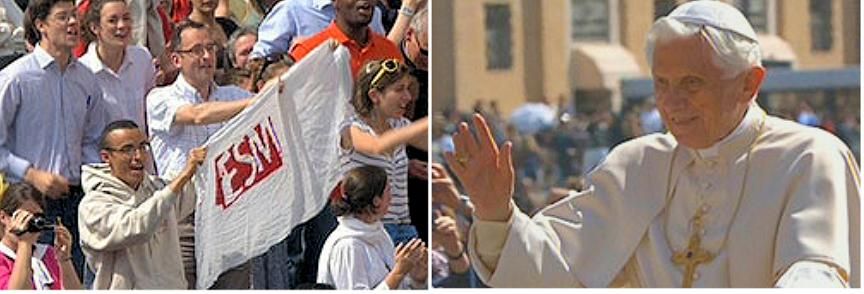
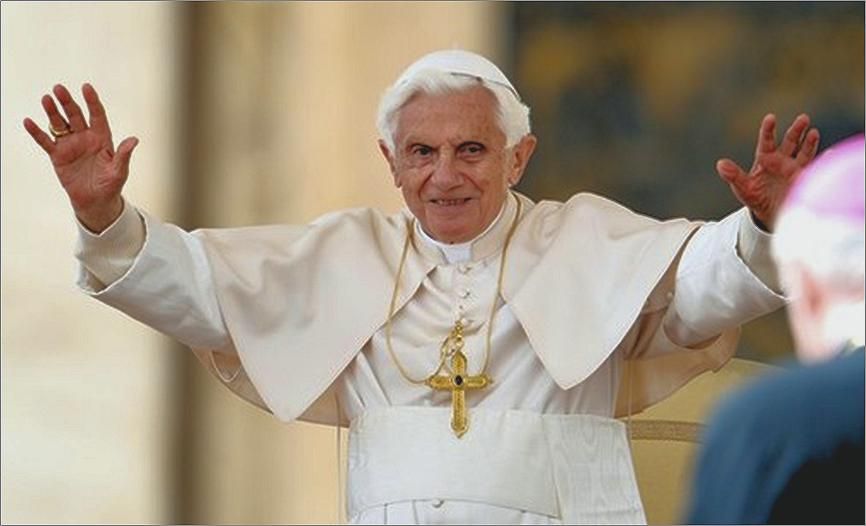
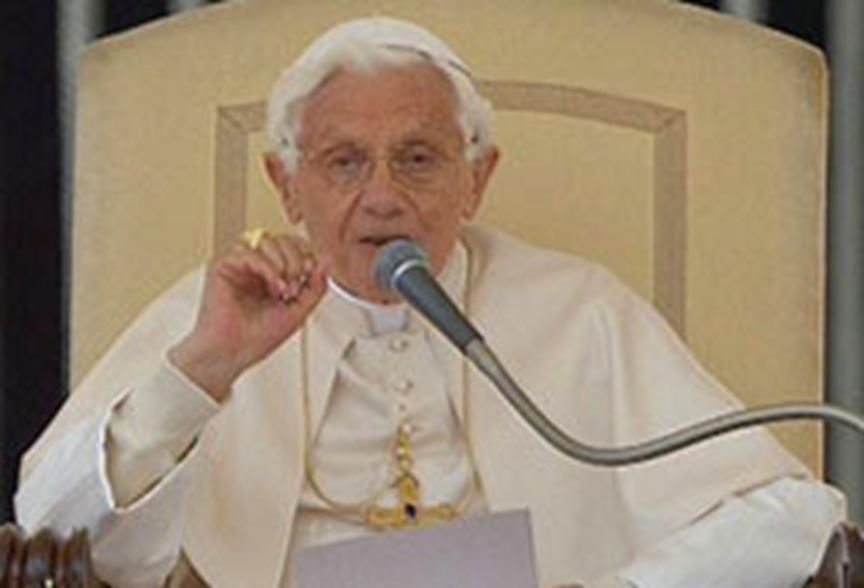
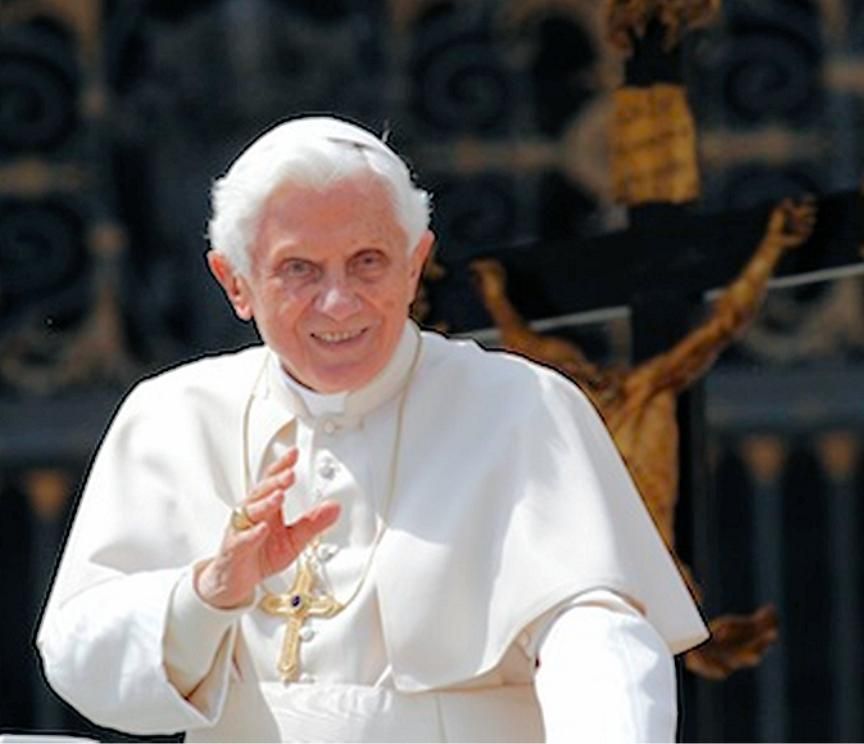
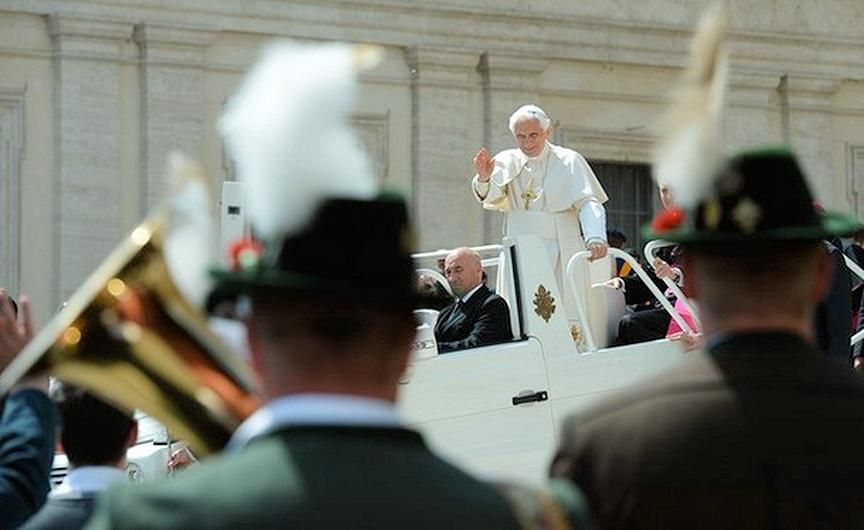
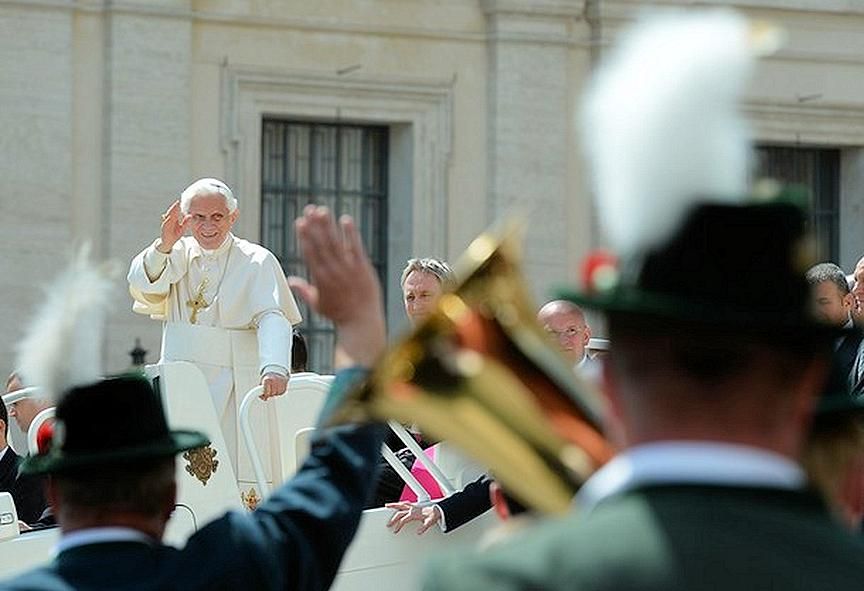


|